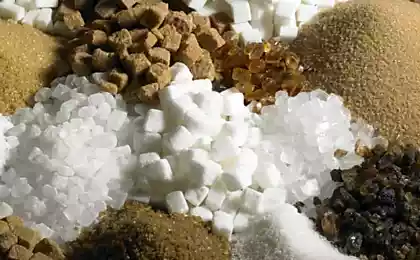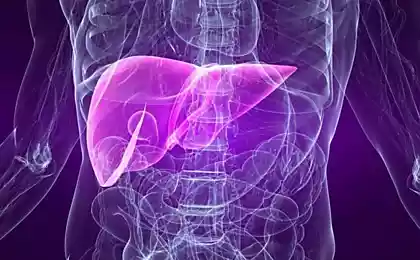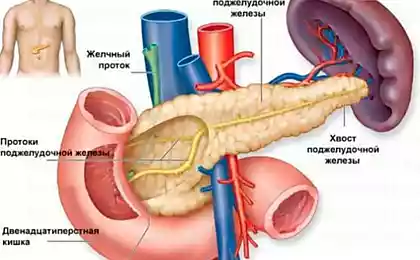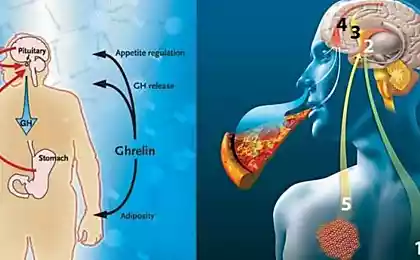687
Read ALL! As sugar destroys the liver and brain
Sugar is a chronic, dose-dependent toxin!Once the sugar was considered a delicacy to relish, which were hard to get. If you are lucky enough, you can add it yourself to coffee or tea.
But, says Dr. Robert Lustig, Professor of pediatric endocrinology at the University of California, San Francisco (KUSF), sugar remained extremely expensive until the mid-18th — early 19th century.
This high cost may actually have been virtuous, because she did excessive consumption of sugar is almost impossible for most people. This is the problem.
According to Dr. Lustig used in excessive amounts sugar acts on the liver as a chronic, dose-dependent toxin (poison).

Why sugar is bad for your liver?Dr. Lustig explains why sugar is so harmful to the liver and how it can lead to diabetes. The main problem with sugar, and processed fructose in particular, is that your liver has a very limited ability to metabolize it.
According to him, one can only safely metabolize about six teaspoons of added sugar a day.
However, the average person consumes 20 teaspoons of added sugar a day. These excessive amounts of sugar are converted in the process of metabolism in adipose tissue and leads to many metabolic diseases:
"Over time, drinking large amounts of sugar can cause strain and disorders of critical organs, including the pancreas and liver. If there is excessive load on the pancreas, which produces insulin to process sugar, it may no longer regulate blood sugar levels appropriately. Large doses of sugar of fructose can overload the liver, which participates in the processing of fructose. The liver converts fructose to fat, which accumulates in the liver and also secreted into the bloodstream. This process contributes to the development of key elements of the metabolic syndrome, including high levels of fats or triglycerides in the blood, high cholesterol, high blood pressure and excess fat in the form of "sugar belly".
Critically high levels of sugar in the blood associated with disorders of the kidneys, Your body can withstand only one teaspoon of sugar in the blood under any circumstances, and this is the critical level. If the level of sugar in your blood will reach one teaspoon, you risk to fall into a hyperglycemic coma and even die.
Your body is doing a great job to prevent such a development, producing insulin, which maintains blood sugar at a safe level. Any food with a high content of carbohydrates in the form of cereals or sugar usually causes a sharp increase in the level of glucose in the blood.
To offset these processes, your pancreas secretes into the bloodstream of insulin, which lowers blood sugar levels and gives you die.
Insulin, however, very effectively lowers blood sugar levels, turning it into fat. So the more insulin you secrete, the fatter you become.
If you are constantly eating food with high sugar content and cereals, the level of glucose in your blood will be correspondingly high and over time your body becomes "insensitive" to insulin, and to carry out its functions will need more and more of it.
In the end, you will develop insulin resistance and later pronounced diabetes. But, as shown by a recent study of the impact of such a cycle of high blood sugar/insulin in the blood begin to manifest even before the appearance of insulin resistance.
The study showed that people with even slightly elevated blood sugar are at greater risk of kidney disease, as evidenced by the two disorders, often accompanying this disease: abnormal blood filtration (hyperfiltration) and high content of protein albumin in the urine.
In people with slightly elevated blood sugar levels 95% higher probability of hyperfiltration, which may contribute to kidney injury in diabetes.
Also they have a 83% higher chance of high protein content of albumin in the urine, which is a sign of early renal damage. In our earlier study it was also found that people with slightly elevated blood sugar (without diabetes or pre-diabetes) showed lower results on tests of memorization.
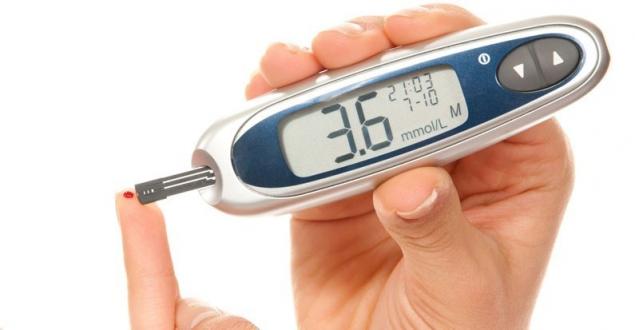
Diabetes of the 2nd type increases the risk of dementiaAlthough insulin is usually mentioned in connection with his role in maintaining blood sugar levels within safe limits, it also plays a role in the signaling system of the brain.
In one animal study researchers, disrupting the signalling of insulin in the brain, failed to cause many of the characteristic brain changes seen with Alzheimer's disease (disorientation, confusion, inability to learn and remember).
There is growing evidence that the pathological process leading to and latinoboy insulin resistance and diabetes of the 2nd type can also affect your brain.
If you consume an excessive amount of sugar and grains, your brain is constantly exposed to high insulin levels and eventually undergoing profound disturbances in the levels of insulin and leptin, which leads to deterioration of ability to think and remember.
Over time this can cause permanent brain damage, in addition to other health problems. It is not surprising, in a new study published in the journal "Diabetes Care", it was discovered that diabetes 2-type 60% increases the risk of dementia in men and women.
Hedonic hunger: unhealthy food causes your brain to demand more food"Hedonic hunger" – is a relatively new concept. It describes the desire to eat, even if your body biologically is not required. It is believed that this phenomenon contributes to the increase in the number of obese people in the US, and almost always it is accompanied by addiction to pleasant on taste products, often containing a lot of sugar and unhealthy fats.
Such high calorie products would be conducive to the survival of people throughout the greater part of human history, when food wasn't always readily available. And although this is not true for many of us, but your body can still be programmed for over-reacting when you feel the taste is very sweet foods.
Furthermore, the more junk food you eat, the more your body gets used to it and require more to get the pleasant feeling that is similar to drug addiction.
Over time, this can lead to the fact that you will need to eating junk food to maintain a feeling of satisfaction. The magazine "world of science" said: "Research has shown that the brain responds to fatty and sugary food to your mouth. It is enough to see the desired object to excite the circuit of pleasure. As soon as this product touches the tongue, the taste buds send signals to different areas of the brain, which, in turn, responds with the release of the neurochemical dopamine.
The result is a strong feeling of pleasure. Frequent excessive drinking is pleasant to the taste of the food nourishes the brain so much dopamine that the brain becomes insensitive to it by reducing the number of receptors that recognize and respond to neurochemical stimuli. As a consequence, the brain of a person abusing a meal, requires much more sugar and fat to achieve the same level of pleasure, which he had received with a lesser amount of food. These people actually continue to overeat in order to feel or even to maintain a sense of satisfaction".
The reorganization of their environment to get rid of the addiction to unhealthy foodFor people addicted to unhealthy food, force alone may not be sufficient for getting rid of addiction. Some experts, such as Michael Lowe, a clinical psychologist Drechselschule University (who coined the term "hedonic hunger"), I suggest restructuring your personal environment as a way of treatment.
This means not bringing junk food home and, if possible, to avoid places where they sell it. The less sugar you eat, the faster you will get rid of your addiction.
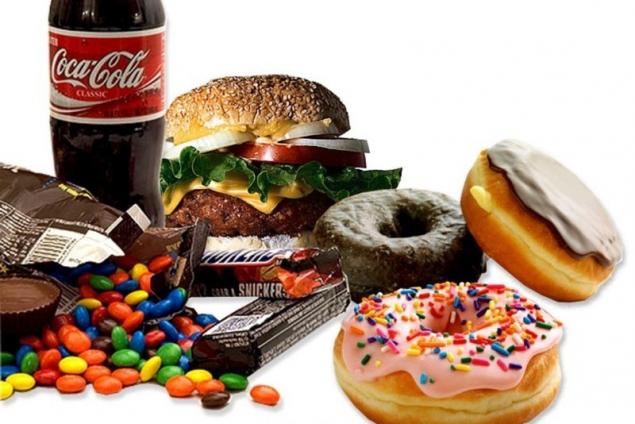
You have a dependence on sugar? Here's how to get rid of it:the unnecessary sugar from your diet is a key element for optimum health. If you currently eat sugar, it is highly likely that you suffer from sugar addiction.
Therefore I highly recommend you to try energy psychology technique called Turbo Tapping, which has helped many people with addiction to fizzy drinks and can also help you to get rid of addiction to any type of sweet.
To minimize the consumption of sugar, you should avoid most of the food products subjected to technological processing because the added sugar found in 74% of such products in more than 60 naimanovna. If you suffer from insulin/latinoboy resistance, diabetes, high blood pressure, heart diseases, excessive weight, limit the overall level of consumption of fructose/sugar to 15 grams per day until you resolve the insulin/latinoboy resistance.
For all others I recommend to limit daily consumption of fructose to 25 grams or less.
A few ways to get rid of addiction to sugar:
Author: Dr. Joseph Mercola
P. S. And remember, only by changing their consumption — together we change the world! ©
Source: russian.mercola.com/sites/articles/archive/2016/09/06/%D1%81%D0%B0%D1%85%D0%B0%D1%80-%D1%83%D0%BD%D0%B8%D1%87%D1%82%D0%BE%D0%B6%D0%B0%D0%B5%D1%82-%D0%BF%D0%B5%D1%87%D0%B5%D0%BD%D1%8C-%D0%BC%D0%BE%D0%B7%D0%B3.aspx
But, says Dr. Robert Lustig, Professor of pediatric endocrinology at the University of California, San Francisco (KUSF), sugar remained extremely expensive until the mid-18th — early 19th century.
This high cost may actually have been virtuous, because she did excessive consumption of sugar is almost impossible for most people. This is the problem.
According to Dr. Lustig used in excessive amounts sugar acts on the liver as a chronic, dose-dependent toxin (poison).

Why sugar is bad for your liver?Dr. Lustig explains why sugar is so harmful to the liver and how it can lead to diabetes. The main problem with sugar, and processed fructose in particular, is that your liver has a very limited ability to metabolize it.
According to him, one can only safely metabolize about six teaspoons of added sugar a day.
However, the average person consumes 20 teaspoons of added sugar a day. These excessive amounts of sugar are converted in the process of metabolism in adipose tissue and leads to many metabolic diseases:
- Diabetes of the 2nd type
- Cardiovascular disease
- Hypertension (high blood pressure)
- Dementia
- Cancer
"Over time, drinking large amounts of sugar can cause strain and disorders of critical organs, including the pancreas and liver. If there is excessive load on the pancreas, which produces insulin to process sugar, it may no longer regulate blood sugar levels appropriately. Large doses of sugar of fructose can overload the liver, which participates in the processing of fructose. The liver converts fructose to fat, which accumulates in the liver and also secreted into the bloodstream. This process contributes to the development of key elements of the metabolic syndrome, including high levels of fats or triglycerides in the blood, high cholesterol, high blood pressure and excess fat in the form of "sugar belly".
Critically high levels of sugar in the blood associated with disorders of the kidneys, Your body can withstand only one teaspoon of sugar in the blood under any circumstances, and this is the critical level. If the level of sugar in your blood will reach one teaspoon, you risk to fall into a hyperglycemic coma and even die.
Your body is doing a great job to prevent such a development, producing insulin, which maintains blood sugar at a safe level. Any food with a high content of carbohydrates in the form of cereals or sugar usually causes a sharp increase in the level of glucose in the blood.
To offset these processes, your pancreas secretes into the bloodstream of insulin, which lowers blood sugar levels and gives you die.
Insulin, however, very effectively lowers blood sugar levels, turning it into fat. So the more insulin you secrete, the fatter you become.
If you are constantly eating food with high sugar content and cereals, the level of glucose in your blood will be correspondingly high and over time your body becomes "insensitive" to insulin, and to carry out its functions will need more and more of it.
In the end, you will develop insulin resistance and later pronounced diabetes. But, as shown by a recent study of the impact of such a cycle of high blood sugar/insulin in the blood begin to manifest even before the appearance of insulin resistance.
The study showed that people with even slightly elevated blood sugar are at greater risk of kidney disease, as evidenced by the two disorders, often accompanying this disease: abnormal blood filtration (hyperfiltration) and high content of protein albumin in the urine.
In people with slightly elevated blood sugar levels 95% higher probability of hyperfiltration, which may contribute to kidney injury in diabetes.
Also they have a 83% higher chance of high protein content of albumin in the urine, which is a sign of early renal damage. In our earlier study it was also found that people with slightly elevated blood sugar (without diabetes or pre-diabetes) showed lower results on tests of memorization.

Diabetes of the 2nd type increases the risk of dementiaAlthough insulin is usually mentioned in connection with his role in maintaining blood sugar levels within safe limits, it also plays a role in the signaling system of the brain.
In one animal study researchers, disrupting the signalling of insulin in the brain, failed to cause many of the characteristic brain changes seen with Alzheimer's disease (disorientation, confusion, inability to learn and remember).
There is growing evidence that the pathological process leading to and latinoboy insulin resistance and diabetes of the 2nd type can also affect your brain.
If you consume an excessive amount of sugar and grains, your brain is constantly exposed to high insulin levels and eventually undergoing profound disturbances in the levels of insulin and leptin, which leads to deterioration of ability to think and remember.
Over time this can cause permanent brain damage, in addition to other health problems. It is not surprising, in a new study published in the journal "Diabetes Care", it was discovered that diabetes 2-type 60% increases the risk of dementia in men and women.
Hedonic hunger: unhealthy food causes your brain to demand more food"Hedonic hunger" – is a relatively new concept. It describes the desire to eat, even if your body biologically is not required. It is believed that this phenomenon contributes to the increase in the number of obese people in the US, and almost always it is accompanied by addiction to pleasant on taste products, often containing a lot of sugar and unhealthy fats.
Such high calorie products would be conducive to the survival of people throughout the greater part of human history, when food wasn't always readily available. And although this is not true for many of us, but your body can still be programmed for over-reacting when you feel the taste is very sweet foods.
Furthermore, the more junk food you eat, the more your body gets used to it and require more to get the pleasant feeling that is similar to drug addiction.
Over time, this can lead to the fact that you will need to eating junk food to maintain a feeling of satisfaction. The magazine "world of science" said: "Research has shown that the brain responds to fatty and sugary food to your mouth. It is enough to see the desired object to excite the circuit of pleasure. As soon as this product touches the tongue, the taste buds send signals to different areas of the brain, which, in turn, responds with the release of the neurochemical dopamine.
The result is a strong feeling of pleasure. Frequent excessive drinking is pleasant to the taste of the food nourishes the brain so much dopamine that the brain becomes insensitive to it by reducing the number of receptors that recognize and respond to neurochemical stimuli. As a consequence, the brain of a person abusing a meal, requires much more sugar and fat to achieve the same level of pleasure, which he had received with a lesser amount of food. These people actually continue to overeat in order to feel or even to maintain a sense of satisfaction".
The reorganization of their environment to get rid of the addiction to unhealthy foodFor people addicted to unhealthy food, force alone may not be sufficient for getting rid of addiction. Some experts, such as Michael Lowe, a clinical psychologist Drechselschule University (who coined the term "hedonic hunger"), I suggest restructuring your personal environment as a way of treatment.
This means not bringing junk food home and, if possible, to avoid places where they sell it. The less sugar you eat, the faster you will get rid of your addiction.

You have a dependence on sugar? Here's how to get rid of it:the unnecessary sugar from your diet is a key element for optimum health. If you currently eat sugar, it is highly likely that you suffer from sugar addiction.
Therefore I highly recommend you to try energy psychology technique called Turbo Tapping, which has helped many people with addiction to fizzy drinks and can also help you to get rid of addiction to any type of sweet.
To minimize the consumption of sugar, you should avoid most of the food products subjected to technological processing because the added sugar found in 74% of such products in more than 60 naimanovna. If you suffer from insulin/latinoboy resistance, diabetes, high blood pressure, heart diseases, excessive weight, limit the overall level of consumption of fructose/sugar to 15 grams per day until you resolve the insulin/latinoboy resistance.
For all others I recommend to limit daily consumption of fructose to 25 grams or less.
A few ways to get rid of addiction to sugar:
- Exercise. Any person regularly doing active physical exercise knows that intensive cardio is one of the best "drugs" of addiction to food. I am always amazed at how much it decreases my appetite, especially for sweet, after a good workout.
I think this mechanism is associated with a sharp reduction in the level of insulin after exercise. In addition, if you still consume sugar or fruit for some time before or after exercise, your blood sugar will not rise, so it will be "burned" in the process of metabolism - Organic black coffee. Coffee is a potent opioid receptor antagonist, and contains compounds such as cafestol contained in large quantity in both normal and decaf coffee, which can bind to your opioid receptors, occupy them and essentially block your addiction to other opioid products. This can reduce the calling dependence of the effects of other substances, such as sugar.
- Sour taste the products. For example fermented vegetables help to reduce sugar cravings. This is doubly useful, as fermented vegetables also promote intestinal health. You can also add water to the juice of a lemon or lime.published
Author: Dr. Joseph Mercola
P. S. And remember, only by changing their consumption — together we change the world! ©
Source: russian.mercola.com/sites/articles/archive/2016/09/06/%D1%81%D0%B0%D1%85%D0%B0%D1%80-%D1%83%D0%BD%D0%B8%D1%87%D1%82%D0%BE%D0%B6%D0%B0%D0%B5%D1%82-%D0%BF%D0%B5%D1%87%D0%B5%D0%BD%D1%8C-%D0%BC%D0%BE%D0%B7%D0%B3.aspx



